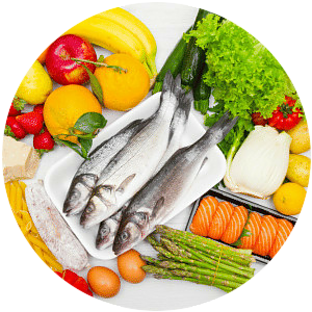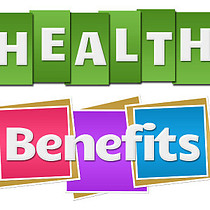While there is such a thing as a simple healthy weight loss diet, it’s not always so simple to figure out what that is! There are more diets out there than you can “shake a stick at,” as the old cliché goes. Sometimes it seems like there are as many weight loss diets as there are tabloids at the grocery store checkout stand. They all say some version of, “Lose X in Y weeks with Z eating plan!”
But if you take out all the hype, it’s not really so very difficult. There are some popular plans that have stood the test because they are based on solid principles that work. We’re going to look in particular at one that I consider “the best.” You might have a different thought, but we have to have a starting point in our discussion.
A Plan That Works

The “eat nothing but ice cream” diet is a plan that works (apparently, though I haven’t tried it). But all ice cream and nothing else is clearly not healthy! (Just in case you were suddenly tempted…)
So let’s start with a general eating plan for health that works. Most of the “experts” who talk about best diet plans, mention “The Mediterranean Diet” as either at or near the top of the “healthy” diet category. It’s not a fad diet, it’s a way-of-life type diet based on the nutritional habits of the people of Greece, Spain, Italy, France, and northern Africa.
The Mediterranean is healthy. And the Mediterranean diet is simple. The Mediterranean diet can be inexpensive if you choose inexpensive foods! So let’s take a look at the foundation cornerstones of this diet – a 4-level food pyramid:
- The core foods are whole grains, fruits, vegetables, beans, herbs, spices, nuts, and healthy fats such as olive oil. These are the mainstay of the diet and can be eaten every day.
- Eat fish or seafood twice a week.
- Eat eggs, dairy, and occasional poultry in moderate amounts.
- Eat red meat and sweets very sparingly.
The Mediterranean diet is both about food choice and physical exercise. It also emphasizes the elimination of stress through a slower pace of life, and eating together with family and friends. Clearly, health goes beyond food choices only – and the Mediterranean diet recognizes this.
Some Health Benefits of the Mediterranean Diet

Point by point, here are some health benefits of the Mediterranean Diet:
- Lower risk of cancer
- Lower risk of cognitive decline
- Lower risk of heart disease
- Lower risk of obesity
- Lower risk of Type 2 diabetes
- Lower risk of metabolic syndrome
- Helps increase stamina
- Helps with overall weight loss
The Mediterranean Diet is easy to follow, and easy to “stay on” because all the foods you eat taste delicious!
The Mediterranean Diet is not primarily a weight loss diet. It’s a healthy diet. It works for weight loss if you follow one other core principle of virtually all weight loss: eat less. If you limit your caloric intake to 1200-1500 calories, it has been suggested that you will lose 5-10% of your body weight in a year on the Mediterranean Diet.
We may not want to hear “count calories,” but that’s pretty much what it comes down to – plus eat healthy food with fiber and nutrients.
A British study discovered that people who lost large amounts of weight, who followed the Mediterranean Diet in their weight loss experience, were twice as likely to keep the weight off as those who didn’t. That’s worthy of note!
Other Good Diets
If some aspect of the Mediterranean Diet doesn’t quite fit you and your needs (don’t be too quick to assume that!), there are other diets that are considered to be healthy, each with their own “angle.” But here are a few, with links for more information:
- Intermittent fasting
- DASH Diet
- MIND Diet
- WW Diet (WeightWatchers)
- Vegan Diet
- The Ornish Diet
- Flexitarian Diet
- Volumetrics Diet
- New Mayo Clinic Diet
- Pescatarian Diet
How I Lost 55 Pounds in 5 Months
I’ll just share my personal story of weight loss from a few years ago.

I discovered at some point that I was having difficulty putting on my shoes and socks in the morning. My stomach was getting in my way! So I thought, How heavy am I? I checked in at around 225 pounds! At 6’1″, I was definitely overweight.
I decided I needed to do something about it. I started on January 1 of that year (I don’t remember exactly which year, but sometime in the early 2000’s). I opened an Excel spreadsheet and graph record of my weight for the next 5 months. (“MyFitnessPal” was not a “thing” back then.)
I didn’t eat any particular foods or follow any particular diet plan. What I did was, I set my calorie limit at 1200-1300 calories a day. (1200, plus a “free” food or two that weren’t actually free, like coffee creamer). I used fairly simple food, although I’m not saying it was all the healthiest! I then “grazed” all day long, but I had a method! I divided up my day into 45-minute intervals. Every 45 minutes, I allowed myself 75 more calories. I planned frequent eating to keep myself from getting hungry. If I did get hungry, all I had to do was think, “Oh, in x minutes I can have something more!” Totally psychological, I know… If I ate more than 75 calories, as I sometimes did, then I figured out how long I would need to wait until I could eat again. For example, if I ate 225 calories instead of 75, I had to wait 3 hours to eat again.
It Worked!
By the end of May, I was down to 170 lbs, my goal weight! If you had looked at my Excel spreadsheet, the weight loss wasn’t always consistent. Some days I was up a pound, maybe two days in a row. But then I was down 3 pounds, etc. But long-term, it kept consistently going down, because I was following my 1200 calorie plan consistently.
I try to stay below 180 pounds… Recently again, I was creeping up into the middle 180-pound range. I didn’t use the “grazing” method so much this time, but I did go back to eating 1200 calories per day. In just a matter of weeks, I was down again to where I wanted to be, and a bit below – hitting as low as 167 pounds. I decided I’d better start eating more, or I would “dry up and blow away,” so to speak! Plain ol’ calorie counting still works, just make sure the food you eat is healthy food.
Summing Up
So in summary, I’ll just leave you with these three points:
- Make sure the food you eat is healthy
- Limit calories as needed. You might need to test this to see what works for you.
- Keep it up by being consistent – long enough to get the job done.
Your body will thank you!
If you have any further questions or comments about this post, please feel free to share them in the space below!
Very Simple and Healthy Recommended Product of the Day:

